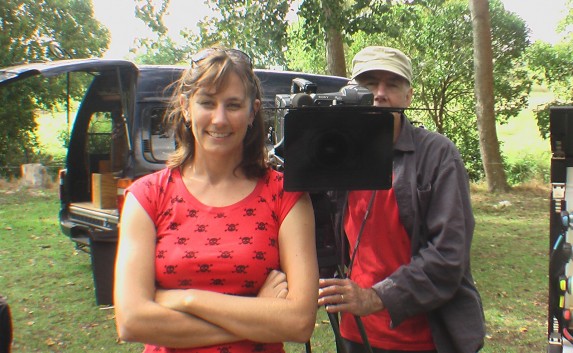‘Topp Twins: Untouchable Girls’ Interview

A native of Winnipeg, Canada, Leanne Pooley has plied her craft as a documentary filmmaker all over the world from productions with the BBC to award winning NZ features. She kindly invited Flicks into her home a few days after the premiere of her latest, The Topp Twins: Untouchable Girls (in cinemas April 9). She explains the documentary is not only a profile of NZ’s most idiosyncratic entertainers – Jools & Lynda Topp – but a chronicle of this country’s recent history.
FLICKS.CO.NZ: Where did the initial idea for the Topp Twins film come from?
LEANNE POOLEY: Arani [Cuthburt], who is the manager of the Twins, approached me to see if I’d be interested in working with them to get a film up. The notion that there should be a documentary about the Topp Twins came from Arani.
What made you say ‘yes’?
They’re amazing characters and it’s a great story, and as a film maker that’s what you want: to be involved in great stories. They were at Bastion point, Rugby Park Hamilton, homosexual law reform, the anti-nuclear movement… it was so obvious their story was the story of New Zealand, but through the Topp Twins’ eyes that gave it a scope and depth.
How was your working relationship with the Twins?
When you’re making a film about someone’s life there’s always a dialogue going on about what you’re doing, and the twins don’t do anything they don’t want to do. If I want them to write a concert for a documentary, they’re going to have to want to do it. Because we used the concert as the framing device we had to sit down and I had to tell them what I needed for the film. And then again the mockumentary segments with them in character, it was my idea but they had to pick up the ball and run with it. The really amazing thing about working with the twins is when you interview them its like a single stream of consciousness coming from two people.
What were your experiences of trying to raise the capital for the film?
It was easier than other films. We went down other roads before we got to the Film Commission, but they were pretty supportive. We wrote the treatment, pitched it to the board and they said yes. We had to convince people it wasn’t just a celebrity profile but it wasn’t that difficult, to convince them that the story was bigger. It’s a story of this country in a funny way and it’s also a story of how unique New Zealand is that two yodeling lesbians can be embraced by the mainstream. It’s completely bizarre.
What were the biggest challenges during production?
We had a huge challenge working out what not to put in, which is a good position to be in. There were scenes that aren’t in the film that I will mourn forever because there was so much stuff. Everything that happened in the last 35 years, they were part of it. The big decision was deciding what to let go. Bigger isn’t necessarily a better film.
Is this a break from your previous, more serious work or an extension?
As a filmmaker I see myself as a storyteller, it doesn’t matter whether it’s the Topp Twins or the Pope. What was lovely about this story was that it’s something that will make people laugh. It’s still serious but they make the serious subject matter funny.
Do you think people too young to remember the Twins will respond to the film?
As a filmmaker you just make it and hope people will respond. The young people that I know that have seen it, and those at the test audience, did enjoy it. But how do we get them to come? Two fifty-year-old lesbians is a hard sell to a twenty-year-old bloke. But it’s funny and not a documentary that’s all wordy and serious. It’s going to be a good night out and it’s a laugh that you can go to with your mates.
How strong is documentary filmmaking in New Zealand and what can be done to improve it?
It’s very difficult to get serious one-off documentaries made. I’ve been tied up for the last two years, so I haven’t been pitching anything lately. You always want more money. There could be more of a commitment from the state broadcaster. I don’t know if it’s any harder than it is anywhere else, it’s just hard. You don’t do it for the money. Although in some ways digital technology is making it easier.
Any plans for the film overseas?
It’s not easy to sell documentaries in an international marketplace, particularly when it’s such a NZ story but it’s definitely getting distributed in Australia. Hopefully it can get into some festivals and that can kick start it. At some of the test screenings there were non-New Zealanders there and they really enjoyed it. I’ve been doing this a long time and I stopped a long time a go trying to figure out what works and what doesn’t. W hen you try and second guess all the time it gets in the way of the craft. You just have to hope that you’ve made a film that you feel good about.


















